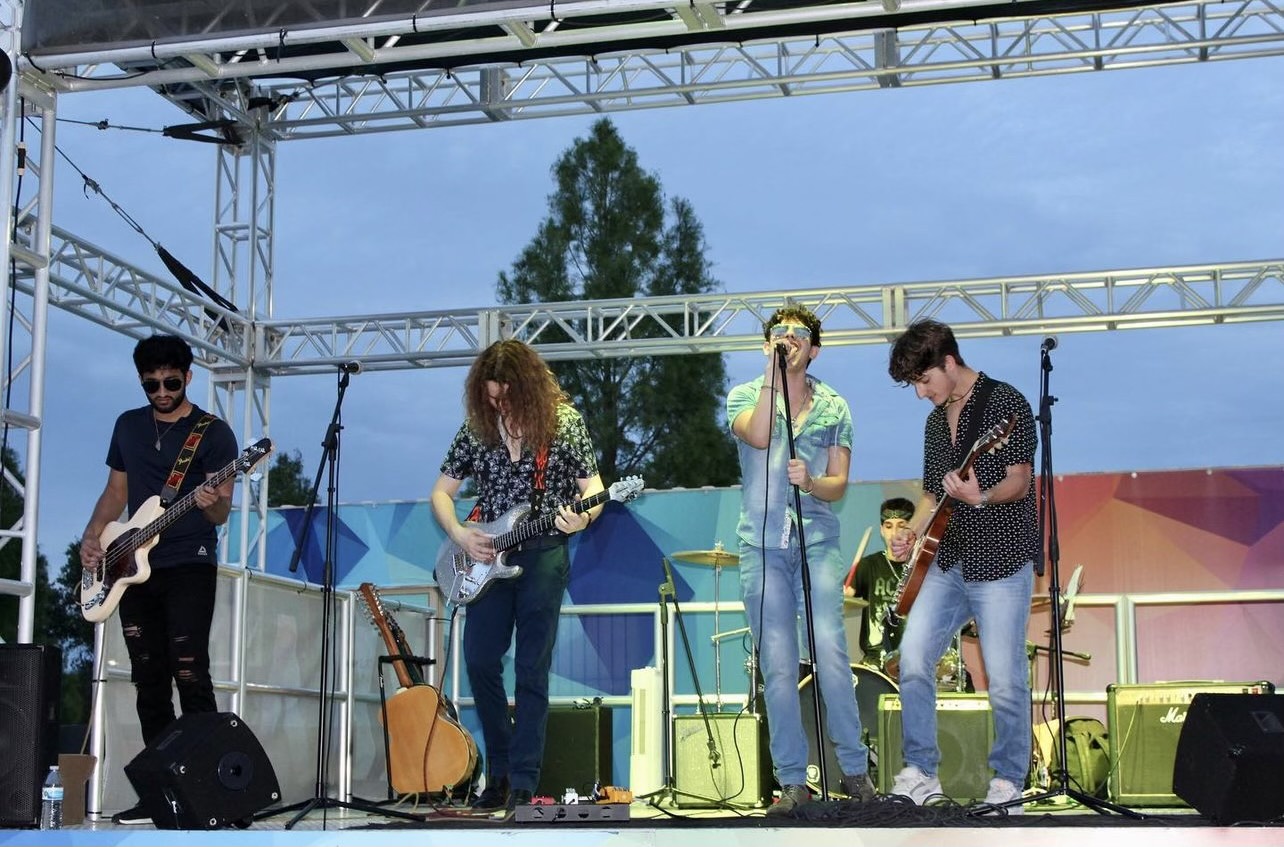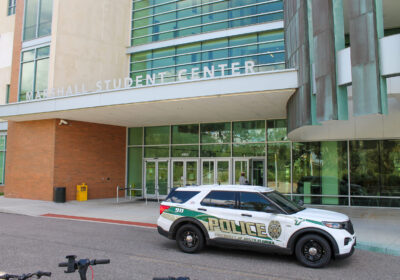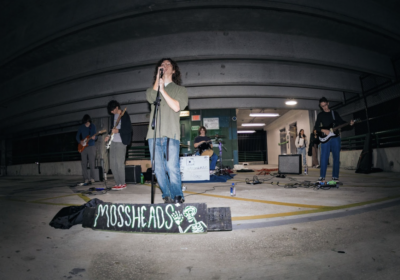The metamorphosis of Hybris: How a student rock band resurrected itself three times against all odds

While successfully embodying influences of legendary rock bands like Bon Jovi, Mötley Crüe and The Strokes, USF student rock band Hybris has proved its gritty, iron-willed perseverance – in true rock and roll fashion – with how it handles tough transformations, transitions and tumultuous times.
The history of Hybris goes beyond borders, time and space as the band had been forced to undergo three complete rebirths after a series of occurrences that led to major turnovers of musicians and sounds overtime.
Founded in Bolivia back in January 2019, the band’s essence made its way to the U.S. in 2021 when founder and lead vocalist José Manuel Luján Suárez – who is now a senior – moved to Florida solo to continue his studies as a mechanical engineering major.
Forced to dissolve the band and return to square one as the only member, he made it his ultimate mission to continue nurturing the potential that Hybris was demonstrating back home.
“It’s got to work. The band’s got to work. It’s just a matter of finding the right combination of people,” Luján Suárez said.
Armed with nothing but hope, faith and two original songs that were released on Spotify by the band, he set out to find new members. He eventually succeeded, gathering a new fleet of musicians in February 2022, but found himself in a similar situation a few months later when more than half of the members had to leave for personal reasons.
Today, Hybris consists of entirely new members except for its founder, and has sown the rewards for remaining resilient through times of uncertainty and turbulence.
Luján Suárez said he was determined to avoid viewing the band temporarily dissolving or band members leaving as a “tragedy.” Instead, he said he looked at it as a chance for rejuvenation and immediately moved forward seeking possible replacements.
“The same way that every failure is a lesson, any possible mishap that could have happened to Hybris was an opportunity for growth,” Luján Suárez said.
“If we correctly learn from our setbacks, they won’t happen again. Then the next setback occurs and we’ll have to learn and improve from there on. There’ll be a point where we’ll have more and more [lessons] covered, bringing us closer to our desired objectives,” he said.
Luján Suárez met drummer and guitarist Dimitrios Tsolakakis through an engineering class they both shared. Tsolakakis, a mechanical engineering major, had already been in a couple of established bands in the area and upon watching him perform, Luján Suárez said he was determined to have him join the band.
Tsolakakis first became the drummer of the band “Hybris 2.0,” as they called the second version of the band, before switching to guitar and becoming the backing vocalist as he entered the third iteration of Hybris. Since the band had experienced such a unique melting pot of styles, genres and members over its generations, finding the right balance of sounds was key for the new members – which meant finding a common ground between a blend of genres like alternative rock, classic rock and heavy metal.
“Since we all looked out for each other, we all collectively agreed whether new sounds and musical styles were too much or too little. Since we all have our inputs to new ideas, everything just balanced out until we established our new unified sound for Hybris,” Tsolakakis said.
“This didn’t take too long and I would say by our second and third shows we started really evening out all our influences into one mash we call the ‘sound of Hybris.’”
After months of rehearsals, numerous trials and errors and a steadily growing unification of the new sounds, Hybris 3.0 finally debuted at its first performance in August 2022. Priscila Picard, a longtime follower of the band and girlfriend of Tsolakakis, reflected on just how different Hybris 3.0 was in comparison to its other versions.
“I remember their following performance really set the tone of where the band was headed. On stage was a new Hybris, new members, new songs and a lot more cohesion. It really was a breath of fresh air, the recent additions to the group were bringing in a lot of energy and excitement to the stage,” Picard said.
Hybris, named after the Greek goddess of insolence, reckless pride and arrogance, proved a fitting name for a band that brought long-lost vigor and energy to the local area, which previously only was notorious for softer genres like jazz and blues. The band’s drummer Garrett Cichocki said it felt purposeful to play a bold role in igniting the dormant rock and roll spirit within citizens.
“I think very quickly we established ourselves as a band that always brings high energy and loud music, which has set us apart from the majority of the local scene, and I think people recognize us for being that high energy, loud rock band, which has earned us a lot of loyal fans,” Cichocki said.
Still, as a rock band that not only strived to bring original and vibrant rock music to the masses but also expand and protect its own creativity, maintaining authenticity was pivotal, according to Cichocki.
“What’s important to me is pushing ourselves to find new sounds and make music that not only the people enjoy, but we can be truly proud of. I never liked the niche of selling out and settling for the mainstream market,” Cichocki said.
Bassist and USF alum Jonathan Jacob said Hybris 3.0 made it a key goal to stick to the core values of the band’s essence and honor the past versions of the songs originally released on Spotify, while also adding its own unique touches through its new members.
Jacob, who is also responsible for the band’s advertising and merchandise production, said the process was made simple by the band’s founder.
“Unifying the new sound of Hybris with the old recordings of the Hybris originals was made easy by José Manuel. By giving us plenty of creative liberty, it felt as if we were updating the song to our liking rather than copying the creators,” Jacob said.
Iliana Lambe, a longtime follower of the band on social media, said the band’s ability to easily adapt to changes and challenges is a talent in itself. She explained a scenario that happened during the first show she attended of theirs back in April in which the bass pedal malfunctioned halfway through.
Along with power issues, the band was forced to rewrite their entire setlist since certain songs relied on the bass pedal. After a few minutes of troubleshooting and changing plans, the band continued their three-hour set successfully.
“I believe that [the band’s] sharp thinking, and the way the band could quickly adapt to the new change, goes to show that Hybris is not only skilled in music, but also experts in problem solving,” Lambe said.
Picard said the band has progressed upwards ever since, despite all the challenges that made it seem impossible to do so.
“Their sound, stage presence, chemistry and confidence have been improving overtime. It’s easy to be a good musician by yourself, but being able to come together as a group and sound like one is on a whole other plane,” Picard said.
With four brand new songs set to release at the end of summer, the band doesn’t plan on stopping production anytime soon. They recently created studio recordings, upgraded their logo, restocked new merchandise and scheduled show dates with venues in the city.
The adventure of building the band’s success through resilience, friendship, talent and trust is what makes the members call the band their second family.
“Knowing that I’m lucky enough to play alongside these prodigies is what makes Hybris special to me,” Jacob said.







